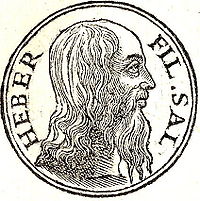Eber
Eber | |
|---|---|
 Eber imagined in the 1553Promptuarium Iconum Insigniorum | |
| Children | Peleg Joktan |
| Parent | Selah |
Eber(Hebrew:עֵבֶר,romanized:ʿĒḇer;Biblical Greek:Ἔβερ,romanized:Éber;Arabic:عٰابِر,romanized:ʿĀbir) is an ancestor of theIshmaelitesand theIsraelitesaccording to theGenerations of Noahin theBook of Genesis(Genesis 10–11) and theBooks of Chronicles(1 Chronicles 1).
Lineage
[edit]Eber was a great-grandson ofNoah's sonShemand the father ofPeleg,born when Eber was 34 years old,[1]and ofJoktan.He was the son ofShelah,a distant ancestor ofAbraham.According to theHebrew Bible,Eber died at the age of 464.[1][2]
In theSeptuagint,the name is written asHeber/Eber(῞Εβερ/Ἔβερ), and his father is called Sala (Σαλά/Σάλα). His son is called Phaleg/Phalek (Φαλέγ/Φάλεκ), born when Heber was 34 years old, and he had other sons and daughters. Heber lived to an age of 464 years.[3][4]
Name
[edit]Thetriliteral rootע־ב־ר,ʕ-b-r,is connected with crossing over and the beyond.[5]Considering that other names for descendants of Shem also stand for places, Eber can also be considered the name of an area, perhaps nearAssyria.[6]
Medieval scholars such asMichael the Syrian,Bar Hebraeus,andAgapius of Hierapolisnoted that the prevailing view was theHebrews(Hebrew:עִבְרִיִּים,romanized:ʿIḇriyyim,also derived from the lettersʿ-b-r) had received their name from ʿEber,[7][8]while others state the name "Hebrew" means "those who cross", a reference to those who crossed theEuphrateswithAbramfromUr of the ChaldeestoHarranand thenCanaan.[6]
In some translations of theNew Testament,he is referred to once asHeber/Eber(Luke 3:35, "Biblical Greek:Ἔβερ] the son ofSerug,the son ofReu,the son of Peleg, the son of Heber, the son ofSelah") but should not be confused withḤeber,the grandson ofAsher,who is mentioned inGenesis 46:17 and inNumbers 26:45, as their names are distinct in Hebrew; Ḥeber isחברwith ahethwhile ʿEber has anayin.
Hebrew
[edit]The 13th-century Muslim historianAbu al-Fidarelates a story noting that the patriarch Eber, the great-grandson ofShem,refused to help with the building of theTower of Babel.As a result, his language was not confused when the tower was abandoned. He and his family alone retained the originalAdamic language,which he identified asHebrew,a language named after ʿEber.[9]
In Islam
[edit]ʿEber is sometimes referred to in classical Islamic writings as the "father" of the "prehistoric, original Arabs" (theʿArab al-ʿĀriba), who lived in theArabian Peninsulaafter theDeluge.[10]ʿEber was also identified with theMuslim prophetHudby some of the early Muslim authorities, who hasa surah named after himin theQuran.[11]Other sources identify the prophet Hud as ʿEber's son.[11][12]
See also
[edit]References
[edit]- ^abLarsson, Gerhard (1983). "The Chronology of the Pentateuch: A Comparison of the MT and LXX".Journal of Biblical Literature.102(3): 401–409.doi:10.2307/3261014.JSTOR3261014.
- ^Genesis 11:14–17
- ^Genesis 11:14–17
- ^"Septuagint Genesis, Ch. 10 - Part 3".
- ^Marcus Jastrow,A Dictionary of the Targumim, the Talmud Babli and Yerushalmi, and the Midrashic Literature(London, W.C.: Luzac & Co.; New York: G. P. Putnam's Sons; 1903), p.1039etc.
- ^ab
 Hirsch, Emil G.;König, Eduard(1903)."Eber".InSinger, Isidore;et al. (eds.).The Jewish Encyclopedia.Vol. 5. New York: Funk & Wagnalls. p. 30.
Hirsch, Emil G.;König, Eduard(1903)."Eber".InSinger, Isidore;et al. (eds.).The Jewish Encyclopedia.Vol. 5. New York: Funk & Wagnalls. p. 30.
- ^Who Were the Hebrews?
- ^"EBER - JewishEncyclopedia".jewishencyclopedia.RetrievedMarch 3,2019.
- ^Morris Jastrow,Ira Maurice Price,Marcus Jastrow,Louis Ginzberg,&Duncan B. MacDonald;"Babel, Tower of",Jewish Encyclopedia;Funk & Wagnalls, 1906.
- ^Buhl, Fr., "Ḏj̲urhum", in:Encyclopaedia of Islam, First Edition (1913-1936),Edited by M. Th. Houtsma,T.W. Arnold,R. Basset, R. Hartmann.
- ^abWensinck, A. J., "Hūd", in:Encyclopaedia of Islam, First Edition (1913-1936),Edited by M. Th. Houtsma,T.W. Arnold,R. Basset, R. Hartmann.
- ^Sijilmāsī, Aḥmad ibn al-Mubārak (2007).Pure gold from the words of Sayyidī ʻAbd al-ʻAzīz al-Dabbāgh = al-Dhabab al-Ibrīz min kalām Sayyidī ʻAbd al-ʻAzīz al-Dabbāgh.John O'Kane, Bernd Radtke. Leiden, the Netherlands. p. 415.ISBN978-90-474-3248-7.OCLC310402464.
{{cite book}}:CS1 maint: location missing publisher (link)
